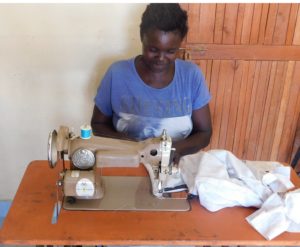Summer 2017 InStitch
Cherehani Africa provides sewing machines to women in rural Kenya to enable them to start and run their own independent tailoring businesses. Lillian Onyango lives and works in Madiany market, Siaya County. Lillian has four children, three of whom go to school. Lillian learned dress-making skills at Ruma Training Institute in 2010 but has been unable to afford to purchase her own sewing machine to enable her to start her own tailoring business. For the last seven years Lilian has been leasing a sewing machine to enable her to generate income and provide for her children.
 She pays a monthly leasing fee of $5, and this fee reduced her profits and chances of ever owning her own machine. When Cherehani Africa met Lilian and told her about our partnership with Sewing Peace that will enable her and many more women in rural Siaya to acquire sewing machines, she was overwhelmed with joy. For her, the sewing machine she has received from Sewing Peace is the first production tool she owns in her own name. Lilian made a down payment of $40 for the sewing machine and committed to completing the deficit of $20 in two months. Lilian no longer has to lease a sewing machine and is able to take home more money to support her family. Through the partnership of Cherehani Africa and Sewing Peace, Lillian no longer has to worry about leasing a tool she depends on for her survival. All her energy and savings are now directed at completing the payment for the sewing machine. “Thank you Sewing Peace for enabling me to own a sewing machine. I will work very hard to ensure that you can extend your support to many more women like me in Kenya,” says Lilian.
She pays a monthly leasing fee of $5, and this fee reduced her profits and chances of ever owning her own machine. When Cherehani Africa met Lilian and told her about our partnership with Sewing Peace that will enable her and many more women in rural Siaya to acquire sewing machines, she was overwhelmed with joy. For her, the sewing machine she has received from Sewing Peace is the first production tool she owns in her own name. Lilian made a down payment of $40 for the sewing machine and committed to completing the deficit of $20 in two months. Lilian no longer has to lease a sewing machine and is able to take home more money to support her family. Through the partnership of Cherehani Africa and Sewing Peace, Lillian no longer has to worry about leasing a tool she depends on for her survival. All her energy and savings are now directed at completing the payment for the sewing machine. “Thank you Sewing Peace for enabling me to own a sewing machine. I will work very hard to ensure that you can extend your support to many more women like me in Kenya,” says Lilian.
Hello David,
The total cost for the machine is $60, which most beneficiaries pay off in six monthly installments of $10. All the machines that we received were in merchantable condition and we have not had to repair any before issuing. We broadly put the machines into two categories: those that could be converted to manual ($60) and those that are strictly electrical ($80). The ones that could be converted to manual have been widely issued as most beneficiaries work in stations without electricity. The electric ones have moved slower because they are more suitable for urban centers.
Best Regards,Robert Mboya
